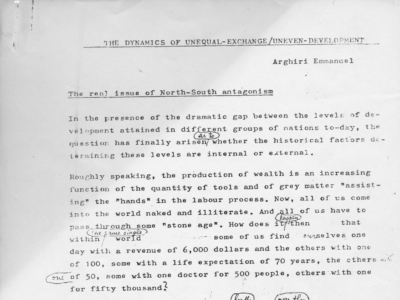Preface by Torkil Lauesen
Arghiri Emmanuel’s letter to Immanuel Wallerstein is dated 13th of June 1972. It comments on Wallerstein’s paper: “The rise and future demise of the world capitalist system: Concepts for comparative Analysis”, a paper that was to be presented at the Annual meeting of the American Sociological Association, New Orleans, in August 1972.
Dear Mr. Wallerstein,
I’m really mixed up to respond so late to your letter from March 20. On the one hand, I found your envelope at home at the end of April, that is to say upon my return from Congo-Kinshasa and the Central African Republic, where I had stayed for about a month. On the other hand, I have had to, during the month of May, unexpectedly replace a professor friend at Nanterres, which with the I.E.D.E.S. and PARIS VII, makes it three universities that I serve. If you add to this the end of year exams you will perhaps find from me some excuses.
I really liked your papers and I completely agree with you on the main points. I particularly noted the description that you give and which seems very accurate to me of the circumstances which surrounded and even conditioned the abolition of slavery, which only replaced the more or less forced labor in local plantations and mines for the same work overseas. I can also verify by my own personal experience the analyses you make, and which seem strikingly true, of the elite African “clerics” and of their motivations, where the tribalism is in the end nothing more than a pretext for regionalism and secessionism. In fact, it is the purest “bureaucratic” case. The state – an end in itself. As you say so well, the options cannot be in this case those of a “government that wishes to stay in power”.
Your 16th century brings me many new elements, but perhaps a little too numerous and too entangled in this summary of popularization to support a theory of the “industrial revolution”. I do not clearly see the main factor which ultimately determined England’s advance, the regression of Poland, the blockade of Northern Italy, the backwardness of France, Could it be the strong, centralized, “technocratic” state of absolute monarchy? But then it’s rather France which should have started first.
I believe that in the final analysis the problem of industrial revolution is a problem of raising agricultural productivity beyond a certain threshold, therefore – apart from one socialist who skips the steps – a problem of introducing capitalist relations in agriculture.
If this is so, there are only two ways to achieve this: directly transform the eminent property of the lord into capitalist property, or transforming peasant holdings into bourgeois property and wait for market relations to dissolve it of their own accord – through the proletarianization of some, the enrichment of others – and transform it into capitalist property. In both cases, we must go, whether we like it or not, through the expropriation of the peasants, immediate and violent in the first, slow and evolving in the second.
And it is here that we encounter the political factor in the relationship of forces of the moment. The revolutionary bourgeois class cannot fight on two fronts, Well, it compromises with the feudal lords and expropriates the peasants together (English case), or it relies on the peasants and abolishes the rights of the feudal lords (French case). In the first case, the “revolution” is peaceful on the political level – as paradoxical as it may appear, it thereby becomes integral on the economic level and allows the productive forces to take a leap forward. In the second, the political revolution is radical and it is through this that it sets up a hybrid system where precapitalist agriculture, fragmentary, becomes a brake, a defect and a mortgage for the future.
I do not underestimate the importance of the overall amount of trade, In my work, I say that it is only during periods of full employment or almost full employment (like it, quite exceptional- the one, that we are currently experiencing), that the capitalist countries begin to pay attention to the terms of trade. During periods of underemployment and depression they are interested in selling more and to “undersell” their competitors, rather than to sell at a higher price. And their need for outlets is such that they sometimes even go so far as to agree to sell, not only for a little, but for nothing at all, for bad or completely irrecoverable debts, for inconvertible dollars today, for clearing marks (the Balkan countries) before the last war.
That said, I think there were a number of other reasons which could counterbalance the American’s desire to keep Europe in its weak economic position and therefore consequently encourage them to launch the Marshall Plan, not the least of which was the fear of the peaceful or violent impact of the U.S.S.R.
We must also not forget that it was the Marshall Plan which constituted the first mechanism for installing the dollar in the reserves of the European Central Banks and thus allowed the United States to monetize its debt to this day. Because, ultimately, it was only a part of this aid and the others which followed which were incorporated into real American values, gold or merchandise, shipped to the rest of the world, and that at the very beginning. The remainder consisted of simple tokens which have not codified anything in the United States, while allowing, it is true, European countries to play with these tokens in the game of international trade, for lack of being able – in this period of economic weakness and lack of mutual trust – to make their own.
Once started, this system, becoming irreversible, allowed, on the contrary, the United States to acquire real values in the rest of the world and finance their wars with their own currency, that is to say, with date recognitions, which, through their monetization on the international level, never have to be repaid.
Very cordially yours,
Arghiri Emmanuel









